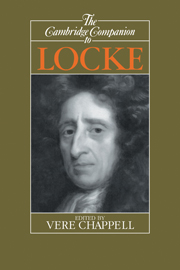Book contents
- Frontmatter
- Introduction
- 1 Locke's life and times
- 2 Locke's theory of ideas
- 3 Locke's philosophy of body
- 4 Locke's philosophy of mind
- 5 Locke's philosophy of language
- 6 Locke's theory of knowledge
- 7 Locke's philosophy of religion
- 8 Locke's moral philosophy
- 9 Locke's political philosophy
- 10 Locke's influence
- Bibliography
- Index
5 - Locke's philosophy of language
Published online by Cambridge University Press: 28 May 2006
- Frontmatter
- Introduction
- 1 Locke's life and times
- 2 Locke's theory of ideas
- 3 Locke's philosophy of body
- 4 Locke's philosophy of mind
- 5 Locke's philosophy of language
- 6 Locke's theory of knowledge
- 7 Locke's philosophy of religion
- 8 Locke's moral philosophy
- 9 Locke's political philosophy
- 10 Locke's influence
- Bibliography
- Index
Summary
Locke's first reference to language in the “Epistle to the Reader” at the outset of his Essay concerning Human Understanding suggests merely a pragmatic, Baconian insistence that we must strive for clarity in language because obscurity of speech is a frequent but avoidable source of theoretical confusion: “The greatest part of the Questions and Controversies that perplex Mankind [depend] on the doubtful and uncertain use of Words, or (which is the same) indetermined Ideas, which they are made to stand for” (E Epis: 13). Such a statement does not imply that one needs any theory about language in order to avoid such problems, but just a special degree of care in its ordinary use. Later passages might also be taken to suggest such a Baconian stance, free of any specific linguistic theory:
Some gross and confused Conceptions Men indeed ordinarily have, to which they apply the common Words of their Language, and such a loose use of their words serves them well enough in their ordinary Discourses and Affairs. But this is not sufficient for philosophical Enquiries. Knowledge and Reasoning require precise determinate Ideas. . . . The multiplication and obstinacy of Disputes, which has so laid waste the intellectual World, is owing to nothing more, than to this ill use of Words. (E III.x.22: 503-4)
- Type
- Chapter
- Information
- The Cambridge Companion to Locke , pp. 115 - 145Publisher: Cambridge University PressPrint publication year: 1994
- 13
- Cited by

